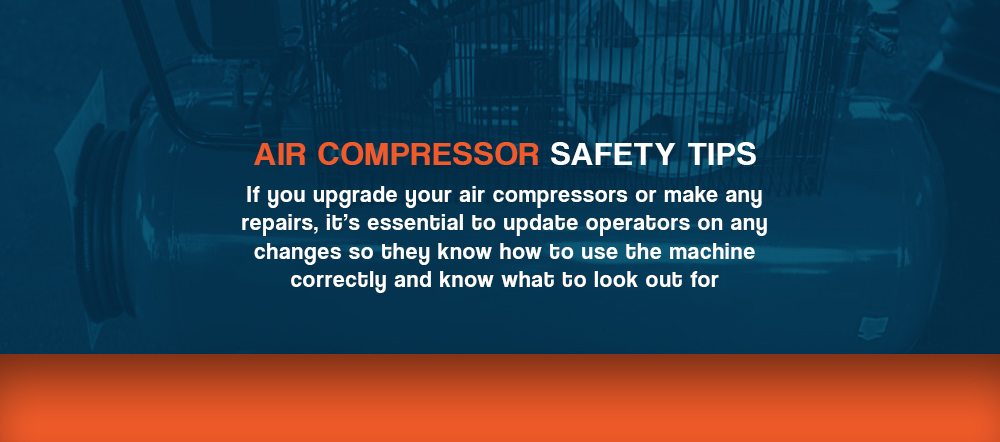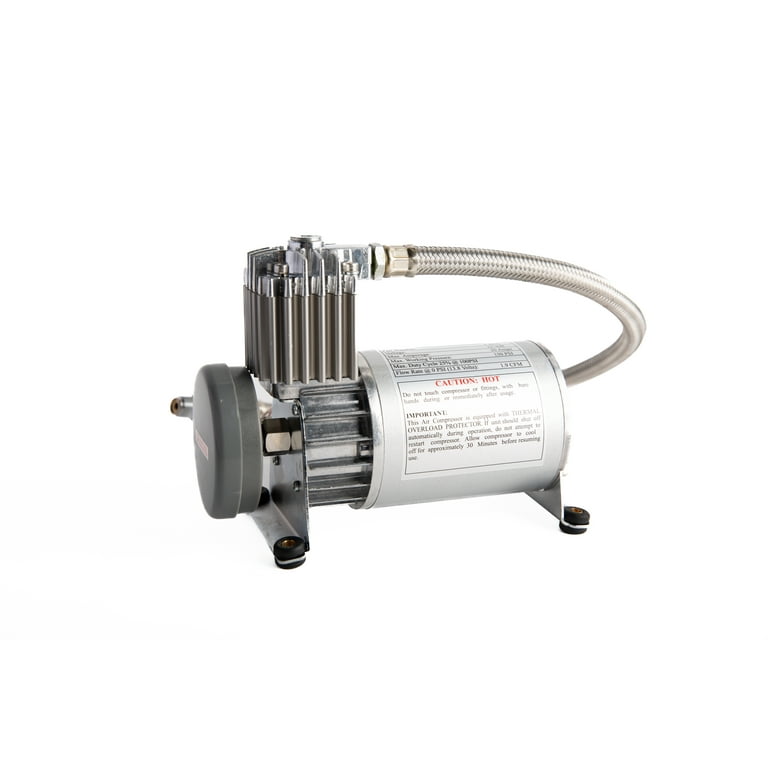The main purpose of an air compressor is to convert power into potential energy stored in pressurized air. It forces air into a storage tank to increase the pressure.
Air compressors play a crucial role across various industries, powering pneumatic tools, HVAC systems, and providing clean, compressed air for delicate processes. These robust devices harness the power of pressurized air to drive machinery and tools, making them indispensable in automotive workshops, manufacturing lines, and construction sites.
Their ability to efficiently store energy allows for consistent and reliable operation of tools such as nail guns, staplers, and spray painters. With the demand for productivity and precision, air compressors serve as the backbone for many mechanical functions, ensuring tasks that require a high degree of force can be completed with ease and efficiency. Choose the right air compressor and it promises to boost performance, ensure safety, and deliver the power your operations need.
Air Compressor Basics
An air compressor is a pivotal tool in many industries. It powers pneumatic tools, inflates tires, and more. This device draws in air and increases its pressure. Let’s dive into what an air compressor is and the various types available.
What Is an Air Compressor?What Is An Air Compressor?
Simply put, an air compressor is a mechanical device. It takes in air at atmospheric pressure. This air then gets compressed into a higher pressure state. The compressed air has many uses. It can drive machinery, tools, and spray paint, among other uses.
Types Of Air Compressors
Air compressors come in different shapes and sizes, tailored for distinct applications. Common types include:
- Piston Compressors: Utilize pistons to compress the air.
- Screw Compressors: Use two meshing screws.
- Portable Compressors: Small and easy to move.
- Stationary Compressors: Larger, stay in one place.
Each type has its own set of advantages. Choice depends on need, be it power, space, or mobility.
Core Functions Of Air Compressors
Air compressors are powerful tools that serve many purposes across various industries. They work by converting power from an electric motor or gasoline engine into potential energy stored as compressed air. This pressurized air can then be used for a multitude of tasks, making air compressors indispensable in many work environments. Let’s explore their core functions in detail.
Converting Power Into Energy
The primary role of an air compressor is to convert electrical power or fuel into kinetic energy. This process involves drawing in air and compressing it, which adds energy to the air. Compressed air can power various tools and machinery. Compressors come in different types, such as reciprocating, rotary screw, and centrifugal, each suitable for specific tasks.
Consider the following applications:
- Powering pneumatic tools like nail guns and ratchets
- Supplying energy for air-operated assembly lines
- Propelling paint sprayers in auto repair shops
Storage Solution For Compressed Air
While generating compressed air is vital, its storage is equally important. Air compressors use tanks to hold compressed air. This ensures a steady supply of air is available on-demand. Stored air must remain at a constant pressure to be effective. Compressors can also have multiple tanks for larger capacity needs.
Key benefits of air storage include:
- Improved energy efficiency by reducing compressor cycling
- Consistent pressure and flow rates
- Prevention of water condensation issues
The proper use and maintenance of air compressors enhance safety, efficiency, and longevity. Understanding these core functions helps users optimize their compressed air systems. This contributes to higher productivity and cost savings over time.
Industrial Applications
The heart of many industrial operations beats thanks to air compressors. These powerful machines serve a multitude of purposes across various sectors. With their ability to convert power into potential energy stored as compressed air, they are essential in numerous industrial tasks.
Manufacturing Processes
Air compressors streamline complex manufacturing workflows. They enable intricate processes. Let’s explore their crucial roles:
- Assembly Lines: Consistent power ensures smooth conveyor operations.
- Injection Molding: Pressurized air shapes plastics into countless products.
- Spray Painting: Uniform applications achieved with air-powered sprayers.
- Metal Finishing: Material surfaces are perfected with air-driven tools.
Powering Pneumatic Tools
Handheld tools gain unmatched power and reliability through compressed air. Performance skyrockets with an air compressor’s help. Below are key sectors relying on pneumatic tools:
| Industry | Pneumatic Tools Used |
|---|---|
| Construction | Jackhammers, Drills, Nail Guns |
| Automotive | Impact Wrenches, Ratchets, Air Sanders |
| Woodworking | Spray Guns, Staple Guns, Engravers |
| Metal Fabrication | Riveting Guns, Chippers, Sanders |

Credit: us.fscurtis.com
Automotive Industry And Air Compressors
The heart of many operations, air compressors play a pivotal role in the automotive industry. They power essential tools and applications. Each task demands reliability and efficiency. Quality and speed in auto manufacturing and repairs hinge on these robust machines. Let’s explore how air compressors are fundamental in automotive tasks.
Spray Painting Cars
Flawless finishes require precise air pressure. Air compressors drive this process. They ensure a steady airflow for spray guns. This guarantees a smooth, even coat. Here are the pivotal ways air compressors serve in car painting:
- Consistent Paint Application: They maintain an unvarying air output. This helps avoid paint splotches.
- Clean Finish: Filtered air from compressors prevents dust. Dust can ruin paint jobs.
- Versatility: Different nozzles can attach due to compressors. This allows varied paint techniques.
Auto Repair Shop Uses
Compressors are multi-use tools in repair shops. They power a multitude of equipment. They are important for efficiency in any shop. Below are key uses of air compressors:
| Tool | Use |
|---|---|
| Air Wrenches | Fasten and loosen nuts quickly. |
| Air Drills | Drill holes with ease and speed. |
| Painting Tools | Deliver smooth paint jobs. |
Air compressors also assist in inflating tires, and powering hydraulic lifts. They help clean parts and contribute to overall shop productivity.
Home Uses And Diy Projects
The main purpose of an air compressor extends beyond the industrial realm. Home uses and DIY projects significantly benefit from this versatile tool. Whether you’re looking to spruce up your living space or tackle practical maintenance tasks, an air compressor offers a helping hand.
Inflating Tires And Toys
Inflating tires and toys is a breeze with a home air compressor. The process is simple, efficient, and saves time. No more trips to the gas station or manual pumping – with the right attachments, the compressor does the job in a snap.
- Car and bike tires
- Pool floats and inflatable mattresses
- Balls for sports and play
Airbrushing And Crafting
Airbrushing and crafting reach new heights with an air compressor. DIY enthusiasts find that airbrushing allows for precision and creativity in their projects. Crafting becomes quicker, smoother, and offers professional-looking results.
| DIY Project | Use of Air Compressor |
|---|---|
| Custom t-shirt designs | Even paint application for vibrant designs |
| Model building | Fine detail work on small pieces |
| Furniture refurbishing | Smooth finish with varnish or paint |

Credit: www.walmart.com
Healthcare And Compressed Air
Compressed air plays a crucial role in healthcare settings, touching nearly every aspect of patient care and surgical procedures. It is the unseen powerhouse vital for driving a multitude of devices. Clean, reliable, and properly regulated air ensures safety and efficiency in healthcare environments. Let’s explore its applications, specifically in respiratory systems and dental tool operation.
Respiratory Systems Support
Compressed air is a lifeline for patients needing respiratory support. It powers devices like ventilators and nebulizers. These machines help patients breathe when they can’t do so on their own. The air must be pure and controlled, as it directly impacts patient health.
- Ensures continuous oxygen supply for critical cases
- Drives mechanical ventilators that assist or replace natural breathing
- Operates nebulizers that convert liquid medicine into mist
Dental Tools Operation
Dental professionals rely on high-quality compressed air. It powers drills, suction devices, and scalers vital for patient care. The air must be dry and free of contaminants to prevent infection and equipment damage. Maintaining optimal dental tool performance is a must for patient experiences and outcomes.
- Enables high-speed dental drills for efficient tooth treatment
- Operates suction devices to keep the mouth dry and clear
- Drives ultrasonic scalers for plaque and tartar removal
Compressed Air In Energy Sectors
The heartbeat of many energy sector operations pulses with the force of compressed air. An air compressor’s main role is to supply power. In the energy sectors, this power is essential. It aids in extracting resources, and constructing energy-generating assets.
Wind Turbine Installation
Powering pneumatic tools is a key task for air compressors during wind turbine installation. Large bolts and precision instruments rely on steady air pressure. These tools anchor turbines to their foundations.
- Cleaning parts with air jets
- Painting via airbrush
- Materials handling
These are additional tasks for air compressors. They ensure quick and safe construction of wind farms.
Oil & Gas Energy Extraction
In the arduous environments of oil and gas extraction, air compressors offer reliable solutions. They power drilling rigs. They energize pneumatic machinery used in offshore platforms.
| Application | Role of Compressed Air |
|---|---|
| Exploration & drilling | Drives drills deep into the earth |
| Maintenance | Cleans and operates equipment |
| Processing | Facilitates movement of crude oil |
Each task ensures effective, efficient extraction and processing. Thus, air compressors are vital in oil and gas sectors.
Environmental Impact
Understanding the environmental impact of air compressors is vital. These machines support countless industries, but they also affect our planet. Let’s explore how air compressors influence the environment.
Efficiency And Energy Usage
An air compressor’s efficiency is crucial to its environmental footprint. More efficient compressors use less energy, which means fewer emissions from power plants. This is important for keeping our air clean.
- Energy-efficient models often have better design features that help to save power.
- Regular maintenance can also improve efficiency and reduce energy consumption.
Choosing high efficiency units is one way to lessen environmental impact. Look for compressors with a high SEER (Seasonal Energy Efficiency Ratio) rating.
Noise Pollution Concerns
Air compressors generate noise, which can contribute to noise pollution. This affects humans and wildlife.
| Type of Compressor | Noise Level (dB) |
|---|---|
| Reciprocating | 70-90 |
| Screw | 60-75 |
| Centrifugal | 70-85 |
To combat noise pollution, industries can:
- Install sound-attenuating enclosures around compressors.
- Put in place noise-reduction protocols.
Maintenance And Safety
The ‘Maintenance and Safety’ of air compressors is critical. Proper care ensures they work well and last long. Safety stops accidents in the workplace. This section provides tips and strategies for keeping your air compressor in top shape.
Regular Servicing Tips
Keep your air compressor running smoothly with these simple tips:
- Check oil levels regularly, and replace if dirty.
- Examine hoses for cracks and wear. Change them if needed.
- Clean air filters often. Dirty filters make compressors work harder.
- Drain moisture from tanks to prevent rust and corrosion.
- Inspect belts for tightness and wear. Adjust or replace as necessary.
- Listen for unusual noises which could signal a problem.
- Have a professional check the compressor annually.
Preventing Workplace Accidents
Accidents can happen without warning. Follow these steps to keep everyone safe:
- Train all users on correct operation procedures.
- Display clear safety instructions near the compressor.
- Provide protective gear like earplugs and goggles.
- Ensure adequate space around the compressor for airflow and maintenance.
- Perform regular safety inspections to catch hazards early.
- Report and fix any safety concerns immediately.
Following these guidelines will help create a safe work environment and keep your air compressor running without any hiccups.

Credit: www.quincycompressor.com
Future Of Air Compressors
The future of air compressors promises innovative changes, shaping the path for more efficient, eco-friendly, and advanced usage. These machines, vital for various industries, will continue to evolve with the demands of modern technology and environmental considerations.
Technological Advancements
As technology progresses, air compressors are becoming smarter and more integrated with digital systems. Expect to see:
- Improved energy efficiency: New models will provide the same power while consuming less energy.
- Intelligent controls: Advanced monitoring systems will automatically adjust compressor settings for optimal performance.
- Smaller, portable designs: Compact compressors will offer high power in smaller frameworks, ideal for mobile applications.
- Maintenance innovations: Predictive maintenance technologies will minimize downtime by alerting users of potential issues before they occur.
Sustainable Practices
Environmental sustainability drives change within the air compressor industry. Anticipated developments include:
- Alternative power sources: Air compressors will heavily rely on renewable energy to reduce carbon footprints.
- Oil-free compressors: Growing in popularity, these compressors eliminate oil waste and contamination risks.
- Recyclable materials: Manufacturers will use more recyclable materials in construction, supporting a circular economy.
- Regenerative systems: Advanced compressors will harness excess energy, redirecting it to other processes or back to the power grid.
Frequently Asked Questions For What Is The Main Purpose Of The Air Compressor
What Is The Primary Function Of An Air Compressor?
The primary function of an air compressor is to convert power into potential energy stored in pressurized air.
What Are The Purposes Of Air Compressors?
Air compressors power pneumatic tools, control system valves, facilitate HVAC systems, and enable processes in industries like manufacturing and automotive services. They also inflate tires and operate paint sprayers for both professional and personal use.
What Is The Objective Of Compressor?
The objective of a compressor is to increase the pressure of a gas or vapor by reducing its volume.
What Is The Main Purpose Of A Compressor In Industry?
The main purpose of a compressor in industry is to increase the pressure of gases for various applications such as powering pneumatic tools, processing and conveying materials, and refrigeration cycles.
Conclusion
Understanding air compressors is crucial for a variety of applications. They power tools, control HVAC systems, and more. Remember, the right compressor can dramatically increase efficiency. Choose wisely, and your operations can thrive through reliable and powerful air compression solutions.
Explore your options and embrace the benefits of this indispensable equipment.

